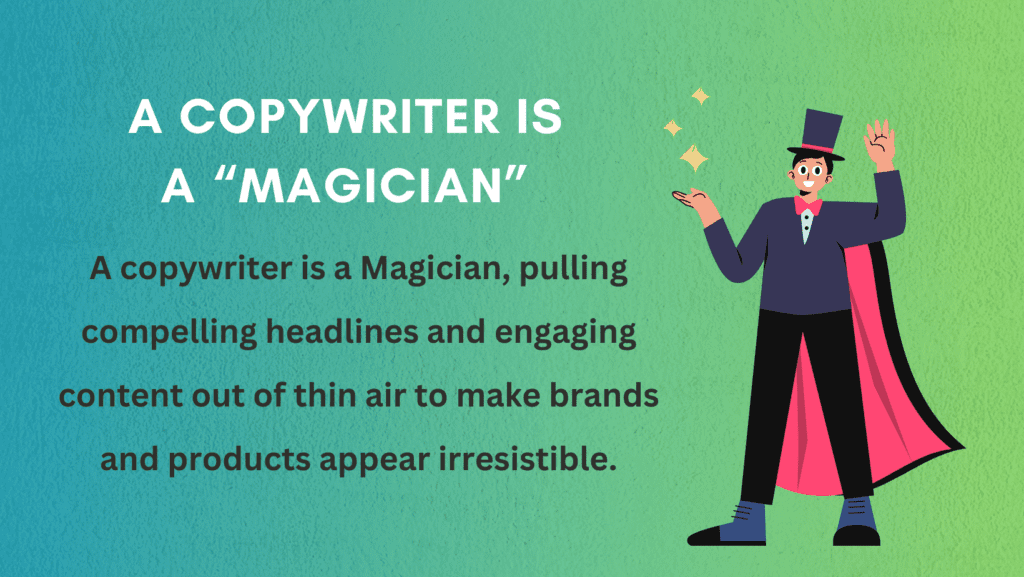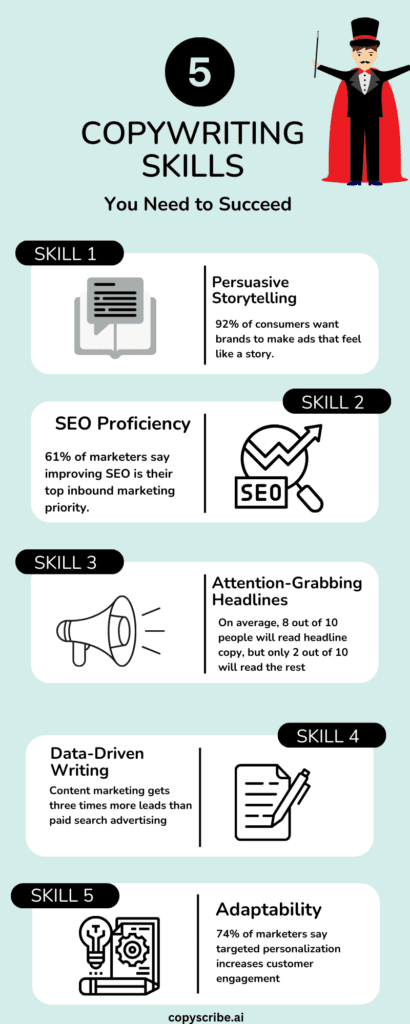Ready to elevate your marketing game? Let’s start with a riddle: What’s the secret sauce behind every successful marketing campaign, the magic wand that turns casual browsers into loyal customers?
The answer is a compelling copy crafted by a master of the art—someone with a unique blend of copywriting skills beyond mere wordsmithing.
In the fast-paced world of digital marketing, it’s not just about slinging catchy slogans or clever one-liners.
It’s about understanding your target audience down to the keyword level, employing research skills that dig deep into consumer psychology, and crafting messages that resonate personally.
But wait, there’s more. The best copywriters don’t just write copy; they’re strategic thinkers, able to accept feedback and adapt, knowing precisely when enough is enough.
They’re grammarians and poets, experts in sentence structure, grammar, and vocabulary, who can make even the most mundane product sound like a must-have.
So, what does it take to be the Mozart of marketing copy?
In this article, we’ll unpack the 11 essential copywriting skills that every marketer should master. From the nuances of SEO to the art of storytelling, we’ve got you covered.
Before we dive into this treasure trove of expertise, let’s set the stage with some basics. Buckle up because you’re about to embark on a journey that could redefine your approach to crafting compelling copy and improve your writing skills.


What Is Copywriting?
Copywriting is the art of crafting persuasive text to drive action. It’s an essential component of any marketing strategy, serving various purposes from product description to email marketing.
A skilled content writer knows how to create compelling messages that resonate with the target audience, whether it’s through a newsletter, website content, or social media posts. The aim is to persuade the reader to take a specific action, such as purchasing or signing up for a service.
In today’s digital age, copywriting also involves understanding search engine optimization (SEO) to ensure the content ranks well in search results. The text must be concise, engaging, and tailored to the reader’s needs and preferences. It’s not just about selling a product; it’s about providing value, solving a problem, and building a relationship with the consumer.
So, the next time you come across a captivating email marketing campaign or an irresistible product description, know that a skilled copywriter has worked their magic behind the scenes.
What Does a Copywriter Do?
A copywriter is a magician in the marketing world, pulling compelling headlines and engaging content out of thin air to make brands and products appear irresistible.
But what exactly does a copywriter do?
Beyond crafting catchy slogans, a copywriter wears multiple hats. They are dedicated researchers, quick learners, and detailed editors. They possess the technical skills to navigate word processing and content management apps, and they are nimble rewriters who can adapt their style to various clients.
Good copywriting is not just about writing; it’s about understanding the audience and the product. It involves SEO copywriting to rank well on search engines and requires the copywriter to be open to feedback and revisions. The copywriting skills you need include mastering sentence structure, grammar, and vocabulary. A copywriter needs to know when to stop researching and start writing, striking a balance between information and engagement.
A copywriter is the backbone of any marketing strategy, creating the textual content that persuades, informs, and entertains the audience. They make brands come alive through words, driving brand awareness and sales.
Therefore, you require important copywriting skills to pursue your passion for becoming a professional or freelance copywriter.
What are Copywriting Skills?
Effective copywriting is more important than ever for promoting a product or service in today’s fast-paced digital landscape. Whether you’re crafting ad copy, blog posts, or any other content, specific skills are essential. Here are five copywriting skills you need to succeed, backed by statistics and insights that underscore their importance.
Persuasive Storytelling: 92% of consumers want brands to make ads that feel like a story. This highlights the importance of mastering the art of storytelling. Engaging your audience emotionally through stories makes your message more relatable and memorable.
SEO Proficiency: Improving SEO is a top inbound marketing priority for 61% of marketers. This skill is non-negotiable for writers who want their content to rank well on search engines. Understanding the nuances of SEO ensures that you’re driving organic traffic to your website, making your written content more visible.
Attention-Grabbing Headlines: On average, 8 out of 10 people will read headline copy, but only 2 out of 10 will read the rest. This underscores the importance of crafting compelling headlines. A well-crafted headline captures attention and entices readers to continue reading, making it a skill every writer needs.
Data-Driven Writing: According to Ahrefs, content marketing generates three times more leads than paid search advertising. This is why copywriting requires a data-driven approach. Utilizing data and analytics allows you to tailor your copy to meet the needs of your target audience, ultimately driving conversions.
Adaptability: 74% of marketers say targeted personalization increases customer engagement. Adaptability in your writing approach allows you to tailor your copy to different platforms and audiences. This increases the effectiveness and reach of your content, making it more likely to engage and convert.
You’ll be well-equipped to create compelling, effective content that resonates with your audience by honing these essential copywriting skills.


Why Do Marketers Need Copywriting Skills?
In the fast-paced marketing world, possessing diverse essential skills is crucial for success. One such skill that often gets overlooked is copywriting.
Why do marketers need copywriting skills?
The answer lies in the power of words to create content that resonates with the target audience.
The Role of Content Creation
Every piece of marketing material, be it a social media post, an email campaign, or a blog, relies heavily on the quality of the copy. A well-crafted message can engage the audience, drive conversions, and build brand loyalty. This is where expertise in the copywriting field becomes invaluable.
Analytics and Adaptability
Moreover, modern copywriting involves analytics skills and more than just writing well. Understanding data allows marketers to tailor their messages more effectively and measure the impact of their copy.
Continuous Learning
To stay ahead in the competitive landscape, continually developing your skills is vital. Copywriting is an evolving discipline, and staying updated with the latest trends and techniques is essential for long-term success.
In summary, copywriting skills are not just a nice-to-have but a must-have for any marketer aiming for excellence.
Copywriting Vs. Content Marketing: Are They Same?
Copywriting and content marketing are often used interchangeably, but they are different. Copywriting focuses on creating persuasive text to get the audience to take a specific action, such as purchasing. It requires analytical skills to understand consumer behavior and craft messages that convert.
On the other hand, content marketing is a broader strategy that involves creating and sharing valuable content to attract and engage a target audience. The aim is not necessarily immediate conversion but to build long-term relationships. When you write something for content marketing, it’s usually informative or educational.
Both are crucial skills for marketers, but they serve different purposes of copywriting and require different approaches.


What is the Impact of Copywriting on Marketing Success
In the ever-evolving marketing landscape, the role of copywriting cannot be overstated. While content marketing provides the informational foundation, copywriting is the persuasive layer, guiding consumers toward a specific action. The synergy between the two is essential for a well-rounded marketing strategy, but the impact of copywriting, in particular, is profound.
Addressing Pain Points
One of the most critical copywriting skills is the ability to identify and address the target audience’s pain points. By doing so, copywriting captures attention and resonates on a deeper emotional level. This is crucial in today’s market, where consumers are looking for products and solutions to their problems. When you can articulate these pain-points better than your customers can, you’re on the path to winning their trust and, ultimately, their business.
The Power of Words
The ability to write compelling and clear copy is a cornerstone of marketing success. A well-crafted message can evoke emotions, inspire action, and lead to conversions. Unlike content marketing, which educates and informs, copywriting has the unique role of persuading and influencing. It’s the difference between telling someone about the features of a product and making them feel like they need to have it.
Interpersonal Skills in Copywriting
While technical writing skills are essential, social skills also play a significant role in effective copywriting. Understanding human psychology, behavior, and emotions can significantly enhance the impact of your copy. It’s not just about what you say but how you say it. The tone, language, and even your copy’s pacing can make or break your connection with the audience.
The Final Nudge
Good copywriting does more than attract; it converts. It’s the final nudge that pushes consumers from consideration to purchase. It complements content marketing by taking an informative foundation and adding a layer of persuasion. This is especially important in the digital age, where social media channels serve as powerful platforms for content and copy, amplifying their reach and impact.
Therefore, copywriting is not just a subset of marketing; it’s a driving force that complements other marketing efforts, including content marketing. By addressing pain points, utilizing the ability to write effectively, employing critical copywriting skills, and leveraging interpersonal skills, good copywriting builds trust and catalyzes action. The secret sauce can make the difference between a passive viewer and an engaged customer.
11 Must-Have Copywriting Skills for a Copywriter and a Marketer
In advertising and marketing, copywriting is an art beyond merely stringing words together. It involves valuable skills that enable you to create compelling marketing content. Whether you’re a seasoned marketer or a budding copywriter, mastering specific skills is crucial for success.
Here are 11 must-have copywriting skills you’ll need to excel in your copywriting job.
- Setting Objectives
The first step in any copywriting task is to set clear objectives. Knowing what you want them to take or achieve with every piece of content ensures you’re on the right track. Improving your copywriting involves aligning your goals with the client’s expectations.
- Grasping the Fundamentals of SEO
In today’s digital age, being able to write SEO-friendly content is non-negotiable. Understanding the basics of SEO ensures that your content ranks well on search engines, reaching a wider audience.
- Demonstrating compassion
Empathy or compassion is crucial in understanding your audience’s needs and pain points. This skill allows you to write content that resonates with the reader, making your advertising and marketing strategies more effective.
- Simplifying Complex Ideas
One of the most valuable skills a copywriter may possess is simplifying complex ideas. This ensures that your message is easily understood, regardless of the complexity of the subject matter.
- Utilizing the Four Pillars of Copywriting
David Ogilvy, often considered the father of advertising, emphasized the importance of the four pillars of copywriting: Attention, Interest, Desire, and Action (AIDA). Mastering these pillars allows you to create content that grabs attention and encourages action.
- Paying Close Attention to Details
Attention to detail is vital in copywriting. Whether it’s grammar, punctuation, or the flow of content, small details can make a big difference in how your content is received.
- Being Flexible with Grammar Guidelines
While it’s essential to know the rules of grammar, being flexible allows you to write more creatively. This flexibility can help you create content that stands out and engages the reader.
- Mastering Marketing Concepts
Understanding basic marketing concepts enhances your copywriting skills. This knowledge allows you to write content that reads well and serves its marketing purpose effectively.
- Applying Psychological Principles
The use of psychological principles in your writing can significantly impact the effectiveness of your content. Understanding what motivates your audience can help you write copy that converts.
- Conducting In-Depth Interviews
Conducting interviews adds depth and credibility to your content. This skill is particularly useful when writing long-form content or case studies, where firsthand accounts and testimonials can add significant value.
- Nurturing a Sense of Curiosity
Curiosity is the cornerstone of creativity. By nurturing a sense of curiosity, you’ll be able to explore new ideas and approaches, making your content fresh and engaging.
Bottom Line
Copywriting involves more than just writing; it’s about crafting messages that resonate with your audience and meet business objectives.
By honing these 11 essential skills, you’ll become a more competent copywriter and a valuable asset in any marketing team.
So, if you want to upgrade your game, consider enrolling in a free copywriting course to sharpen your skills further.
Tips to Improve Copywriting Skills
In the ever-evolving marketing landscape, one skill set remains invaluable: copywriting. Whether crafting a compelling email campaign, writing product descriptions, or creating social media content, your copywriting skills will also be crucial in persuading people to take the action you want. But what are the skills you’ll need to excel in this field?
Here are some essential copywriting tips to help you become a more effective communicator.
Gain Industry-Specific Knowledge to Tailor Your Writing
A good copywriter needs to understand the industry they are writing for. This goes beyond just knowing the jargon; it involves understanding your target audience’s pain points, desires, and needs. With excellent research skills, you can tailor each piece of copy to resonate with your audience, making your message more impactful.
Enroll in Digital Courses to Enhance Your Skill Set
The digital world constantly changes, and your copywriting needs to keep up. Enrolling in digital courses can provide you with the marketing skills necessary to stay ahead of the curve. Whether it’s SEO, content marketing, or social media advertising, these courses can offer valuable insights and the perfect way to improve your writing.
Work on Minor Assignments to Accumulate Experience
You need to start small before you can write words that change the world. Working on minor assignments allows you to accumulate experience without the pressure of high-stakes projects. This is also an excellent opportunity to fine-tune your spelling and grammar, foundational skills for any copywriter.
Hone Your Writing Abilities Through Consistent Practice
As with any skill, practice makes perfect. Consistent practice is key to honing your writing abilities. Whether it’s through daily journaling, blogging, or freelance projects, the more you write, the better you’ll get.
Experiment with Various Copy Styles to Diversify Your Portfolio
Don’t limit yourself to one style or medium. Experimenting with various copy styles diversifies your portfolio and makes you more adaptable to different projects. This flexibility can make you more marketable and open up new opportunities in your career.
Becoming a proficient copywriter involves more than just writing well. It requires a diverse skill set, from industry knowledge to marketing skills. By following these tips, you can improve your copywriting skills and create content that engages and persuades your audience to take the action you desire.
5 Ways to Modify Writing for a Specific Audience
In the realm of content creation, understanding your audience is paramount. Whether you’re in advertising or marketing, copywriting aims to connect with a specific group of people. Your communication skills help you do just that. Here are five ways to modify your writing to resonate with your target audience.
Identify Audience Needs
Before you start writing, it’s crucial to understand what your audience is looking for. This includes the ability to identify their problems, desires, and questions. Knowing your audience’s needs will guide you in creating relevant and engaging content. This is where your content marketing knowledge comes into play. The better you understand your audience, the more effectively you can address their needs.
Use Appropriate Tone and Language
The tone and language you use can make or break your content. If you’re writing for professionals in a specific industry, jargon might be acceptable. However, if your audience is more general, keeping the language simple is best. Your communication skills help you gauge the appropriate tone for your audience.
Structure Content Strategically
How you organize your content can significantly impact its effectiveness. For instance, a step-by-step format might be best if you’re writing an instructional guide. On the other hand, an opinion piece might benefit from a more free-flowing structure. The key is to structure your content to make it easy for your audience to follow and understand. This is where you can refine your skills and stay ahead of the curve.
Incorporate Relevant Examples
Examples can go a long way in making your content more relatable and understandable. When you include examples that your audience can relate to, you make your points more precise and increase engagement. In advertising or marketing, examples can serve as mini-case studies that effectively demonstrate your point.
Adjust Complexity Level
The complexity level of your writing should match the comprehension level of your audience. If you’re writing for experts, you can delve into complex topics and details. However, it’s best to keep things simple for a general audience. Copywriting is one area where adjusting the complexity level can significantly affect how well your message is received.
By employing these five strategies, you can create content that resonates with your target audience and serves your objectives effectively.
Optimize Results with Strategic Copywriting and Marketing
In today’s digital landscape, the power of well-crafted copy cannot be overstated. Strategic copywriting and marketing are not just buzzwords but essential skills that can make or break your business. Whether creating compelling email marketing copy or showcasing examples of copywriting that convert, the goal remains to optimize results.
Enter CopyScribe AI, a cutting-edge content creation solution designed to make your life easier. Fueled by artificial intelligence, CopyScribe AI produces diverse content, from blog posts and articles to emails and ad copy. The platform is designed to analyze specific information related to your input and craft original, SEO-friendly, and engaging content tailored to your needs.
What sets CopyScribe AI apart is its user-friendly interface and advanced algorithms, ensuring each piece of content is not unique but optimized for search engines. With just a few clicks, you can generate high-quality content that resonates with your audience and ranks well in search results.


In summary, strategic copywriting and marketing synergy can significantly impact your business outcomes. Leveraging tools like CopyScribe AI can streamline this process, allowing you to focus on what you do best—growing your business.
Copywriting FAQs
Copywriting is the act of writing text for advertising or other forms of marketing. For example, Nike’s slogan “Just Do It” is a piece of copywriting designed to inspire action.
Beginners can start by studying successful examples of copy, taking online courses, and practicing writing their copy. Reading books on the subject and finding a mentor in the field is also beneficial.
Copywriting skills include writing clearly and persuasively, understanding the target audience, SEO knowledge, and writing compelling headlines and calls to action.
Copywriting involves creating original content for marketing purposes, while copyediting consists of reviewing and correcting existing content for clarity, grammar, and style.
Copywriting can be considered both a soft and hard skill. The creative and persuasive aspects make it a soft skill, while the technical aspects, like understanding SEO and mastering language rules, make it a hard skill.


